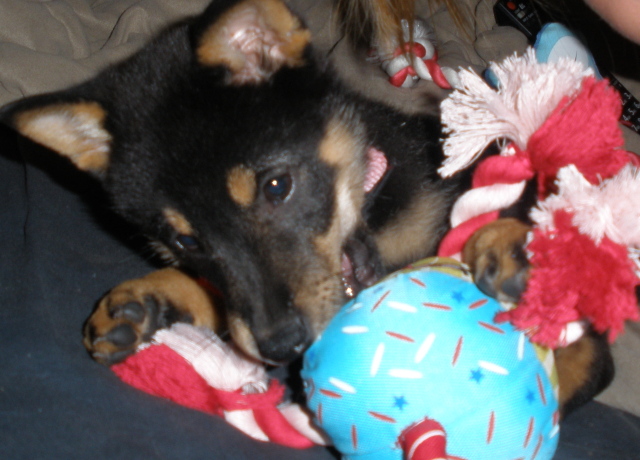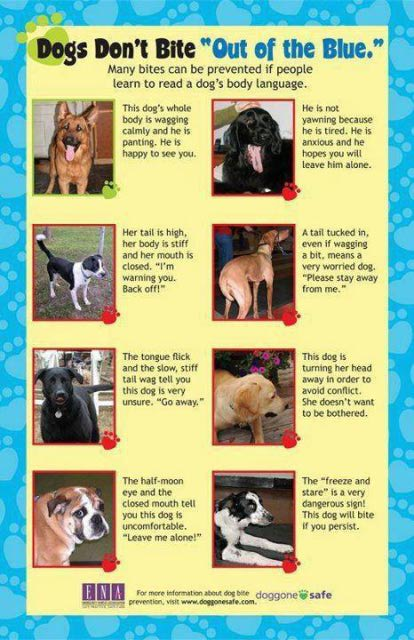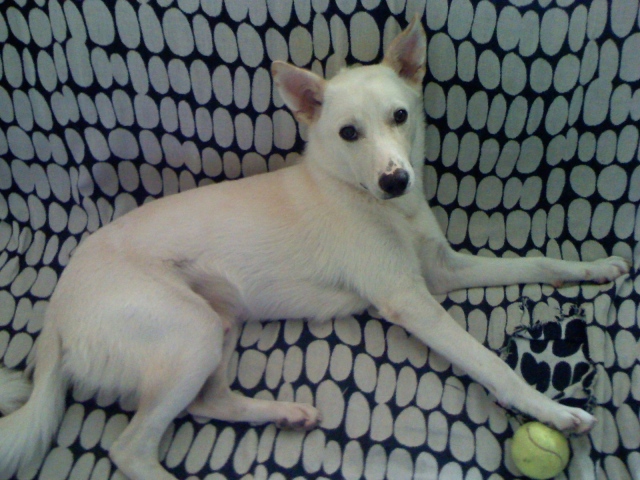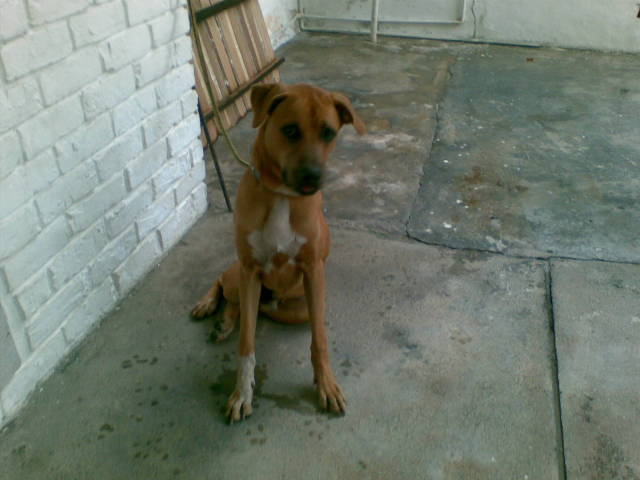QuestionQUESTION: My wife and I just adopted a nine year old female Husky from a rescue ranch. She was very skiddish for the first few days when we brought her home, so much so that it would take 5 to 10 minutes just to get a leash on her. When she would wake up at 3:30 AM disoriented and upset, to calm her down, once i finally got the leash on her, I would take her outside for a walk. I then just started to leave the leash on her in the house for the first two or three days so I could calm her down. Then I started using calm assertive commands (i.e. sit, stay) outside and then in the house and took the leash off in the house. I was able to spend a lot of time doing this because I coincidentally had some time off work. I handled this for the first couple of days but knowing I would soon be going back to work and that my wife would be with the dog all day, I began to get my wife involved with her. She immediately bonded with my wife but simultaneously began to become even more distrustful of me, in spite of the fact that I was calm assertive with her. She has NEVER bit or even snapped at me but she gets nervous if my wife goes into another part of the house. If she can't find my wife, she'll start doing the Husky barky howl thing at me. It got the point where she was so attached to my wife that she wouldn't let me walk her any more. I would put her harness on and take her outside and once we got to the front yard she would keep wanting to go back in the house. Although, this morning I did manage to get her to go for a 30 minute walk. She tried pulling against her harness once she saw where I was taking her but I calmly asserted my will and she begrudgingly gave in. We had a great walk and she got to play with another dog along the way. Her previous owner was a woman who had the dog in with about 10 other dogs which she kept outdoors in a fenced in Kennel area, each dog having it's own huge cage. The previous owner had a stroke and was unable to care for the dogs and turned them into the county shelter. After losing 10 lbs over a 30 day period, a rescue organization got her out of there and had her for another 30 days. Whereas she LOVES being with other dogs, I could tell right away that she had never been leash walked and was not used to being around humans. What is so wierd is that there have been at least two occasions where we took her into another house with people (once was at my father's house and the other time was at the vet) and she was totally fine with me then. What would you recommend I do or not do at this point?
T-H-A-N-K-S for any and all advice!
Steve
ANSWER: Your first instincts regarding using a house tab (indoor leash) and calm commands (working a dog for praise and reward helps build a bond of trust and calms the dog) were right on. you seem to have a strong instinctual understanding of this dog. This dog came from an extremely neglectful environment (her first "home"); she was not socialized to people; she was allowed to form primary bonds with other dogs and she most likely never met a man or had dealings with any until she was taken to the county shelter (probably with a snare pole and then a rope being led to a cage by most likely a male attendant.) Her associations with men have NOT been good or rewarding. you are most likely one of the first (assuming the rescue organization had male volunteers) to interact with her in a positive way. The fact that she overbonded to your wife is a direct result of her former "home" where her only human contact was with a woman. It's unlikely this dog, at 9 years of age, spent her entire life with that woman, or she wouldn't be adapting to your household at all. She must have been acquired at some point in adulthood. You don't mention a problem with house training so I'm assuming the dog is eliminating outdoors; this alone tells me that she has been someone's indoor companion at some point, may have escaped from the yard (Huskies are notorious runners) and been adopted from a shelter, or even relinquished because of problem behaviors (people need to understand the Husky before getting one.) At this point in her life, most people would have passed her by; congratulations for not only taking her in, but for caring enough to want to help her be comfortable and happy in your home.
The reason she seems fine with you when you are in the homes of others is because she does have a bond of trust with you and does see you as high ranking (and therefor sticks close to you among strangers in a strange place.) She prefers your wife and attempts to avoid you in your own home most likely as a combination of response perseverance (discomfort with a man caused by lack of socialization and/or traumatic experience) and self imposed low rank (avoiding the leader, Huskies are very close to type in behavior; a low ranking member of the pack will avoid direct contact with the highest ranking member, showing real submission when in his presence: rolling eyes, panting, yawning, lip licking, etc.) There are things you can do to remedy this.
Read Turid rugaas, "Calming Signals" and learn how to read your dog's body language; study positive reinforcement training and use it to teach her one behavior ("sit" is the easiest but make up a new word) you can ask her for, and she can offer successfully, for treat/praise. Learn about it at ClickerTraining.com, but put the clicker in your pocket at first, she may be fearful of the sound (this is not uncommon.) if you can't use a clicker, use a small squeaker (found in stuffed toys, the squeakers can be purchased separately); you can also use the toy itself and incorporate it into the training, as in:
http://www.dogplay.com/Activities/obedience.html
The Husky was designed to work for a living and live in packs; that's why she's happiest among other dogs (and also because she was so confined for quite a while to the exclusion of most people.) They are independent and can be not as quick to offer physical affection; early socialization and handling is everything and in this case it's a moot point. Your dog will learn to trust you by working with you in training; she can also learn to trust you by your hand feeding her one of her meals. Put the bowl in your lap, sit on the floor and offer a handful of food. Give her some time to decide if she wants to approach; if she totally avoids this, abandon it for a while until the training events have increased and she's working more happily for you. Handfeeding a dog is a simple way to strengthen (or even create) a bond of trust. You handfeed a portion of the food from the bowl, then put the bowl down and walk away, leaving the dog to finish its remains. This secures your psychological rank while at the same time reminding the dog (its genetic tendency) that "If I give it to you, it's yours", strengthening her self perceived place in your household and promoting her trust in you. Once you've learned about positive reinforcement and dog body language, you can reward (click or squeak) a confident posture with you, a step forward on your walks outdoors (from a tentative demeanor), and every show of trust and confidence. Doing this over the course of several weeks should help your relationship with this dog enormously. Calm, consistent, loving, firm but fair, intelligent management is the way to go, and I know you can do it.
---------- FOLLOW-UP ----------
QUESTION: Thanks for your response, it is quite helpful. When we first brought her home she urinated on our tile laundry room floor but I think it was because she was really frightened. After that we watched her very closely and whenever we heard her get up in the middle of the night (or day) and start pacing, we would take her outside to go potty. She slept on a little bed in the laundry room for the first couple of nights. We did have an issue one night with her eliminating two times in the laundry room but I think it had more to do with a problem she was having with diarrhea that night as well as her fear. Up to that point, as long as we were in the next room talking she would sleep but if we went into our bedroom (on the other end of the house) she would get extremely anxious and start the barky howling. My wife got her to start sleeping on a little bed in our bedroom (where she can see my wife) and we have not had one problem with her eliminating in the house since. She pretty much sleeps through the night now and will let us know when she needs to go out.I guess this probably does mean that she at one time, lived in a house?
Once again, when I came home from work, the dog started up with her barky howling. I had to go back out and run and errand but when I came back she was more calm. She wanted to go for a walk after a while but when she saw that I had the harness she started up again. I got her to sit down and put the harness on her and rewarded her with lots of affection for obeying (whenever she allows me to do so I reward her with a lot of affection)and both my wife and I walked her. BTW, my wife and I alternate feeding her. It has only been 3 weeks since we brought her home so I guess this will take time. She is a beautiful, sweet dog and well worth the effort!
Thanks for all of your help
Steve
AnswerFrom her behavior as described, she has definitely lived in a home and is house trained. A dog not house trained will simply eliminate anywhere indoors. Her "baying" (as you describe the bark) may be a SIGN OF GREETING. It is quite common for a dog to vocalize upon the return of the highest ranking member of the household. As I have said, the Husky is very close to type in many behaviors, and vocal greeting (as well as howling/baying when separated from the pack) is NORMAL. By going out and coming in a few minutes later, you effectively ignored the baying, which is good, and you see the immediate result (since she didn't repeat it when you returned the second time.) If she bays upon your entry to the home, ignore her until she stops (but not for too long, she needs reassurance ofher place in your household), then reward with non-dominant affection (don't restrain her in a hug, that's very dominant, she has to learn to tolerate it); use positive reinforcement training asap. I can't tell you how marvelously this method promotes psychological and emotional health in fearful, avoidant, or otherwise disaffected dogs. It's only been three weeks. You and your wife are doing a MARVELOUS JOB! Your wife's moving her into the bedroom and teaching her to use her own bed is brilliant! I have great respect for people like you. Perhaps you should think about donating some time to your local shelter or humane society when this situation has resolved. Much luck and please keep me advised.

 My Shiba Inu
Question
Lola
I bought a registered Shiba Inu puppy fro
My Shiba Inu
Question
Lola
I bought a registered Shiba Inu puppy fro
 Is this aggression, dominance, or play?
QuestionQUESTION: I have a question regarding doggy beh
Is this aggression, dominance, or play?
QuestionQUESTION: I have a question regarding doggy beh
 Dog walking problems
Question
Snickers
I have been trying to train my dog SN
Dog walking problems
Question
Snickers
I have been trying to train my dog SN
 dogs behaviour
QuestionMy 8 months old Dusto
QUESTION: My puppy
dogs behaviour
QuestionMy 8 months old Dusto
QUESTION: My puppy
 uncontrollable beagle
Question
max
My beagle is a year and a half. Ive had hi
uncontrollable beagle
Question
max
My beagle is a year and a half. Ive had hi